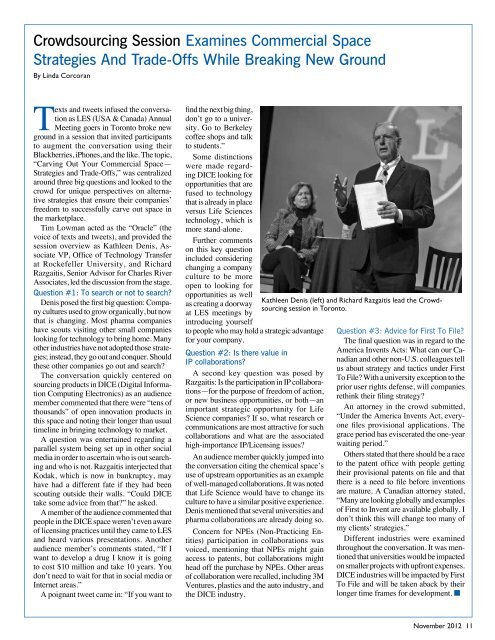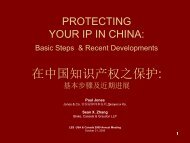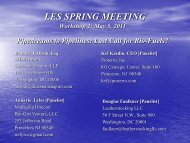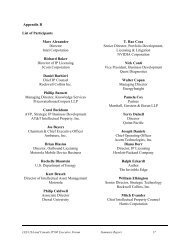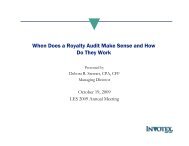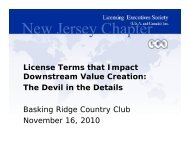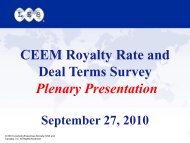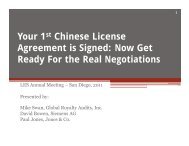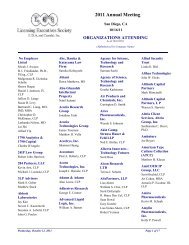A: Marie - Licensing Executives Society USA and Canada
A: Marie - Licensing Executives Society USA and Canada
A: Marie - Licensing Executives Society USA and Canada
Create successful ePaper yourself
Turn your PDF publications into a flip-book with our unique Google optimized e-Paper software.
Crowdsourcing Session Examines Commercial Space<br />
Strategies And Trade-Offs While Breaking New Ground<br />
By Linda Corcoran<br />
Texts <strong>and</strong> tweets infused the conversation<br />
as LES (<strong>USA</strong> & <strong>Canada</strong>) Annual<br />
Meeting goers in Toronto broke new<br />
ground in a session that invited participants<br />
to augment the conversation using their<br />
Blackberries, iPhones, <strong>and</strong> the like. The topic,<br />
“Carving Out Your Commercial Space—<br />
Strategies <strong>and</strong> Trade-Offs,” was centralized<br />
around three big questions <strong>and</strong> looked to the<br />
crowd for unique perspectives on alternative<br />
strategies that ensure their companies’<br />
freedom to successfully carve out space in<br />
the marketplace.<br />
Tim Lowman acted as the “Oracle” (the<br />
voice of texts <strong>and</strong> tweets), <strong>and</strong> provided the<br />
session overview as Kathleen Denis, Associate<br />
VP, Office of Technology Transfer<br />
at Rockefeller University, <strong>and</strong> Richard<br />
Razgaitis, Senior Advisor for Charles River<br />
Associates, led the discussion from the stage.<br />
Question #1: To search or not to search?<br />
Denis posed the first big question: Company<br />
cultures used to grow organically, but now<br />
that is changing. Most pharma companies<br />
have scouts visiting other small companies<br />
looking for technology to bring home. Many<br />
other industries have not adopted those strategies;<br />
instead, they go out <strong>and</strong> conquer. Should<br />
these other companies go out <strong>and</strong> search?<br />
The conversation quickly centered on<br />
sourcing products in DICE (Digital Information<br />
Computing Electronics) as an audience<br />
member commented that there were “tens of<br />
thous<strong>and</strong>s” of open innovation products in<br />
this space <strong>and</strong> noting their longer than usual<br />
timeline in bringing technology to market.<br />
A question was entertained regarding a<br />
parallel system being set up in other social<br />
media in order to ascertain who is out searching<br />
<strong>and</strong> who is not. Razgaitis interjected that<br />
Kodak, which is now in bankruptcy, may<br />
have had a different fate if they had been<br />
scouting outside their walls. “Could DICE<br />
take some advice from that?” he asked.<br />
A member of the audience commented that<br />
people in the DICE space weren’t even aware<br />
of licensing practices until they came to LES<br />
<strong>and</strong> heard various presentations. Another<br />
audience member’s comments stated, “If I<br />
want to develop a drug I know it is going<br />
to cost $10 million <strong>and</strong> take 10 years. You<br />
don’t need to wait for that in social media or<br />
Internet areas.”<br />
A poignant tweet came in: “If you want to<br />
find the next big thing,<br />
don’t go to a university.<br />
Go to Berkeley<br />
coffee shops <strong>and</strong> talk<br />
to students.”<br />
Some distinctions<br />
were made regarding<br />
DICE looking for<br />
opportunities that are<br />
fused to technology<br />
that is already in place<br />
versus Life Sciences<br />
technology, which is<br />
more st<strong>and</strong>-alone.<br />
Further comments<br />
on this key question<br />
included considering<br />
changing a company<br />
culture to be more<br />
open to looking for<br />
opportunities as well<br />
as creating a doorway<br />
at LES meetings by<br />
introducing yourself<br />
to people who may hold a strategic advantage<br />
for your company.<br />
Question #2: Is there value in<br />
IP collaborations?<br />
A second key question was posed by<br />
Razgaitis: Is the participation in IP collaborations—for<br />
the purpose of freedom of action,<br />
or new business opportunities, or both—an<br />
important strategic opportunity for Life<br />
Science companies? If so, what research or<br />
communications are most attractive for such<br />
collaborations <strong>and</strong> what are the associated<br />
high-importance IP/<strong>Licensing</strong> issues?<br />
An audience member quickly jumped into<br />
the conversation citing the chemical space’s<br />
use of upstream opportunities as an example<br />
of well-managed collaborations. It was noted<br />
that Life Science would have to change its<br />
culture to have a similar positive experience.<br />
Denis mentioned that several universities <strong>and</strong><br />
pharma collaborations are already doing so.<br />
Concern for NPEs (Non-Practicing Entities)<br />
participation in collaborations was<br />
voiced, mentioning that NPEs might gain<br />
access to patents, but collaborations might<br />
head off the purchase by NPEs. Other areas<br />
of collaboration were recalled, including 3M<br />
Ventures, plastics <strong>and</strong> the auto industry, <strong>and</strong><br />
the DICE industry.<br />
Kathleen Denis (left) <strong>and</strong> Richard Razgaitis lead the Crowdsourcing<br />
session in Toronto.<br />
Question #3: Advice for First To File?<br />
The final question was in regard to the<br />
America Invents Acts: What can our Canadian<br />
<strong>and</strong> other non-U.S. colleagues tell<br />
us about strategy <strong>and</strong> tactics under First<br />
To File? With a university exception to the<br />
prior user rights defense, will companies<br />
rethink their filing strategy?<br />
An attorney in the crowd submitted,<br />
“Under the America Invents Act, everyone<br />
files provisional applications. The<br />
grace period has eviscerated the one-year<br />
waiting period.”<br />
Others stated that there should be a race<br />
to the patent office with people getting<br />
their provisional patents on file <strong>and</strong> that<br />
there is a need to file before inventions<br />
are mature. A Canadian attorney stated,<br />
“Many are looking globally <strong>and</strong> examples<br />
of First to Invent are available globally. I<br />
don’t think this will change too many of<br />
my clients’ strategies.”<br />
Different industries were examined<br />
throughout the conversation. It was mentioned<br />
that universities would be impacted<br />
on smaller projects with upfront expenses.<br />
DICE industries will be impacted by First<br />
To File <strong>and</strong> will be taken aback by their<br />
longer time frames for development. ■<br />
November 2012 11


